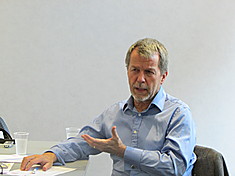Concepts and fads come and go in public policy, often with little in the way of lasting impact. What may seem central to decision making for a period of time can swiftly drop out of fashion, replaced with another equally transient approach. Bearing this in mind, how then should we respond to more recent trends towards putting citizens at the heart of economic decision making, and of broadening our societies so that growth is more inclusive and sustainable?
At the RSA (the Royal Society for the encouragement of the Arts, Manufactures and Commerce), we are taking this trend seriously. As an organisation rooted in Enlightenment principles of human autonomy, individual action and decisions for the common weal, we see the evolution of our economy into one which is for the people as crucial to creating a strong society for all.
… launched RSA Citizens’ Economic Council, an innovative new approach which will bring people across the UK together to engage with the national economic decisions of the country.

We are looking to respond to this in several ways – through our Inclusive Growth Commission, through our work on the sharing economy and supporting the self-employed, including young entrepreneurs, through our thought leadership around the topic of basic income.
Crucially, we are also looking to drive this idea through our recently launched RSA Citizens’ Economic Council, an innovative new approach which will bring people across the UK together to engage with the national economic decisions of the country. In short, through this process, we will demonstrate that as the noted economist Ha-Joon Chang proclaimed in an RSA public lecture, since illustrated by an RSA Animate, that economics is for everyone.
The RSA’s Citizens’ Economic Council
The Citizens’ Economic Council aims to increase the influence citizens have over national economic policy, promote approaches that are more collaborative, happen early on and upstream, and that build bridges rather than create divisions between diverse groups We are going to do this by bringing people together from across the UK to form our Council of citizens drawn randomly from across the country – who will be paid for their time and their civic contribution to public policy. They will meet from January to August, engaging in deliberation and discussion about the economy, work, our institutions and how they operate and our economic futures. They will be actively involved in shaping a set of economic values that our country should consider, as well as specific policies that might support those values. We will provide support to this group of 50-60 individuals in helping them to learn key issues and skills needed to engage with the complex landscape of economics – but also empower them to develop ideas and responses which are relevant to their needs and experiences. This may take us in some new and unexpected directions, and is certain to provoke new opportunities for exploring the diversity of economic discourse in the country. And we wish to demonstrate that informed, thoughtful citizens bring an entirely new and different perspective to economic policy.
The necessity of this approach is clear to see. We are in a time of significant uncertainty, where the shock of Brexit and its associated uncertainties, national economic upheaval and the uncertainty of Scotland’s constitutional upheaval present huge challenges to the status quo. At the same time, we have huge opportunities in place to use this uncertainty for radical, creative change. The Scottish Government has placed the inclusive growth agenda at the heart of its national strategy, offering an invitation for new approaches. Radical concepts such as Basic Income, previously considered at the fringes of political thinking, are now gathering support as recognition grows that changes to the nature of work and the challenges of a huge section of society living as a precariat must be addressed. And the growth of measures such as Participatory Budgeting, which has evidence of its success behind it in places such as Porto Alegre in Brazil and has been used in Scotland. My colleague Reema Patel who runs the Citizens’ Economic Council has blogged about her experiences at the recent international Participatory Budgeting Conference organised by the Scottish Government challenges the presumption that the economy should be organised separate to the communities it serves.
… the shock of Brexit and its associated uncertainties, national economic upheaval and the uncertainty of Scotland’s constitutional upheaval present huge challenges to the status quo.
So how can you contribute? In my role as Head of RSA Scotland, I am always keen to develop stronger links and collaborations across the country, and to find the shared points of interest which exist for us. We are blessed, and cursed, in Scotland being such a small country, and so successful change must come from coalitions striving towards shared goals.
You can contact me to discuss working together on bringing the roadshows and evidence gathering events of the Citizens’ Economic Council to Scotland, to ensure that there is a strong Scottish voice, and relevance in the Council’s findings. Moreover, Reema and I are keen to explore specific Scottish case studies which can feed into the Council’s thinking, whether that be areas where the economy has been working for its citizens; areas where radical news have been tried (e.g. participatory budgeting in Leith); or where we can see communities which have been divorced from the economic life of the country, and who need new ways to become involved.
Economics should be for everyone, and it’s imperative that it becomes so. For too long the language of economists has been twisted into forms inaccessible to the majority of citizens, and they have therefore been left alienated from the process. Together we can find a new shared language and space which can revolutionise Scotland, and return us to our roots in the Scottish Enlightenment which are so desperately needed once more today.







